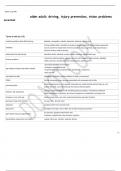8/9/24, 2:32 PM
older adult: driving, injury prevention, vision problems
Jeremiah
Terms in this set (15)
medical conditions that affect driving diabetes- neuropathy, arthritis, dementia, cataracts, hearing loss
driving related skills is a toolbox of evidence based, practical, office-based assessment
CADReS tools to screen for impairment in the key areas of vision, cognition, and motor/sensory
function as they relate to driving.
intervention for safe driving education-limits, refresher courses, rehab- exercise, regular check ups
choose the right time/place, express concerns with empathy, listen actively, highlight
driving cessation
safety concerns, provide alternate transportation, address grief
-decreased flexibility and strength
-changes in posture and gait
age related changes that affect mobility
-drug therapies causing hypotension, drowsiness, or dizziness
-bone density
risk factors for falls pathologic conditions, adverse effects of meds, environment
FRIDs fall risk increasing drugs: strongly associated with increased risk for falls
do fall assessment on every patient, keep bed low wheels locked and bed rails up, call
preventing falls
button near bed, non skid footwear and instruct client properly
provides a determination of risk for falling based on gender, mental and emotional
Hendrich fall assessment
status, symptoms of dizziness, and known categories of medications increasing risk.
changes in eyes with age ptosis, sunken eyes, eye color, pupil size decrease, decrease function
decrease in tear duct function dry eye, itchy, blurred vision
cataracts clouding of the lens, blurred vision
Glaucoma damage to the optic nerve, often due to high intraocular pressure
dry and wet. gradual central vision loss
age-related macular degeneration
treatment: supplements, laser therapy, injections
preventative measure for eye health regular check ups, nutrition, assistive devices
1/1




